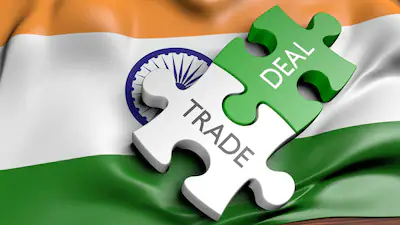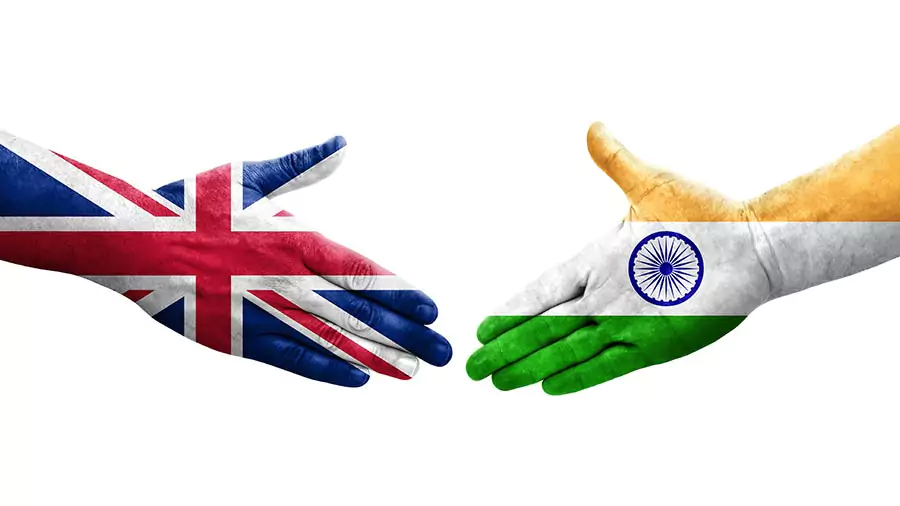India-UK Free Trade Agreement (FTA) Negotiations
Introduction
On November 19, 2024, India and the United Kingdom (UK) agreed to restart negotiations for a Free Trade Agreement (FTA) in 2025 following the election of a new Labour government under Prime Minister Keir Starmer. The decision was made during a bilateral meeting between Prime Minister Starmer and Indian Prime Minister Narendra Modi at the G20 Summit in Rio de Janeiro.
Despite over 14 rounds of negotiations since January 2022, the FTA has yet to be finalized due to challenges such as tariff reductions, investment rules, labour mobility, and environmental commitments. Both countries now aim to revive talks and address unresolved issues to finalize a mutually beneficial trade deal.
What is a Free Trade Agreement (FTA)?
A Free Trade Agreement (FTA) is a pact between two or more countries to reduce or eliminate trade barriers such as tariffs, quotas, and export restrictions. The primary objective is to facilitate trade by lowering costs and improving market access.
How is an FTA different from a Comprehensive Economic Partnership Agreement (CEPA)?
| Feature | FTA (Free Trade Agreement) | CEPA (Comprehensive Economic Partnership Agreement) |
|---|---|---|
| Focus | Primarily on trade in goods (reducing tariffs and trade barriers). | Covers goods, services, investment, intellectual property, and competition policies. |
| Scope | Limited to trade liberalization (tariffs, quotas). | Broad agreement encompassing multiple economic sectors. |
| Economic Cooperation | Focuses on reducing trade barriers for goods. | Aims for deeper economic integration. |
| Examples | India-ASEAN FTA | India-Japan CEPA, India-South Korea CEPA |
Background of India-UK Trade Talks
Timeline of FTA Negotiations
- 2022: Trade negotiations began under UK Prime Minister Boris Johnson.
- 2023-2024: Despite multiple rounds of talks, the agreement was delayed due to leadership changes in the UK (Rishi Sunak succeeded Boris Johnson).
- March 2024: Last round of discussions held before general elections in both countries.
- November 2024: Talks were officially restarted under Keir Starmer’s Labour government.
Why is the India-UK FTA Important?
- For the UK: Helps rebuild trade ties post-Brexit, reducing reliance on the EU.
- For India: The UK is its 4th-largest export destination, and an FTA will enhance economic opportunities in textiles, pharmaceuticals, and IT.
Economic and Strategic Significance
- India is the 5th largest economy, and the UK is the 6th largest – boosting trade ties would benefit both nations.
- Post-Brexit UK Strategy – The UK is seeking new trade agreements outside the EU to sustain its global economic position.
- Job Creation & Economic Growth – The FTA would lead to increased employment opportunities and economic growth in both countries.
- Strengthening the Commonwealth Connection – India, as the largest Commonwealth country, plays a crucial role in the UK's post-Brexit trade plans.
- Countering China’s Influence – A strong India-UK partnership can reduce reliance on Chinese supply chains.
Latest Developments in India-UK FTA Talks
- November 19, 2024: India and the UK agreed to restart FTA negotiations in 2025 following the election of UK Prime Minister Keir Starmer (Labour Party).
- Location of the Decision: The agreement was made during a bilateral meeting between PM Starmer and Indian PM Narendra Modi on the sidelines of the G20 Summit in Rio de Janeiro.
- Background: Trade negotiations had begun in January 2022, but after 14 rounds of discussions, no final agreement was reached due to political changes in the UK and unresolved trade issues.
- UK General Elections (July 2024): The transition from a Conservative government (Rishi Sunak) to a Labour government (Keir Starmer) caused a temporary halt in trade talks.
Key Highlights from Recent Talks (Post-November 2024 Meeting)
Commitment to Restart Negotiations in 2025
- Both sides have reaffirmed their commitment to reaching a "balanced and mutually beneficial"
- Negotiations are expected to resume in mid-2025 after internal policy reviews by the Starmer government.
New UK Government's Approach
- Labour Party’s trade policy focuses on stronger labour and environmental commitments.
- The UK might push for stricter regulations in these areas, which India has historically resisted.
Strategic Importance for the UK
- The UK is focusing on diversifying its trade relationships post-Brexit.
- The FTA with India is expected to help the UK recover from economic slowdown and boost exports.
Strategic Importance for India
- The UK is India’s 4th-largest export destination, and an FTA could further boost trade.
- India wants better access for IT, pharma, and textile sectors, along with eased work visa norms.
Major Issues That Remain Unresolved
Despite progress, several contentious issues continue to stall final negotiations:
| Issue | India’s Stand | UK’s Stand | Current Status |
|---|---|---|---|
| Tariff Reductions (Whisky, Automobiles) | India is reluctant to reduce 150% import duty on whisky and 100% duty on luxury cars. | UK wants lower tariffs to boost exports of whisky, automobiles, and EVs. | Pending – India may agree to gradual tariff reduction instead of immediate cuts. |
| Labour Mobility & Work Visas | India wants eased visa rules for IT, healthcare, and finance professionals. | UK is hesitant due to domestic job concerns but may consider selective relaxation. | Pending – Labour government may introduce "sector-specific" visas. |
| healthcare, and finance professionals.. | but may consider selective relaxation. | introduce "sector-specific" visas. | |
| Intellectual Property Rights (IPR) | India wants flexibility in patents to protect affordable generic medicines. | UK wants stronger patents and IPR protections for its pharma and tech industries. | Pending – India is negotiating exceptions for life-saving drugs. |
| Data Protection & Digital Trade | India insists on data localization (storing user data within India). | UK wants free data flow for global businesses. | Pending – A hybrid model may be explored. |
| Carbon Border Tax (CBT) Relief | India opposes the UK’s CBT, arguing it will increase export costs. | The Labour government supports strong climate policies, including CBT implementation. | Uncertain – Negotiations will focus on possible exemptions for Indian industries. |
| Bilateral Investment Treaty (BIT) Dispute Resolution | India prefers local legal remedies for trade disputes. | UK wants international arbitration mechanisms. | Unresolved – India may agree to a partial international arbitration model. |

Current Economic & Trade Context
Bilateral Trade (2024-25 Estimates)
- Total Trade: £42 billion (~USD 53.2 billion) (up from £37 billion in 2023).
- India’s Exports to the UK (April-Sept 2024): $7.32 billion ( 12.38% growth).
- India’s Imports from the UK: $4.2 billion ( 30% growth).
Top Indian Exports to the UK
- Mineral fuels, machinery, pharmaceuticals, textiles, IT services.
- Precious stones, iron & steel, and chemicals (account for 68.72% of total exports).
Top UK Exports to India
- Whisky, automobiles, industrial machinery, financial services, and telecom products.
Key Economic Growth Areas
- India’s economy is projected to grow at 6.5% in 2025, and the UK sees India as a critical trade partner.
- UK businesses are keen to expand investments in India’s fintech, infrastructure, and digital economy.
Key Areas of Future Cooperation
Beyond trade, the FTA discussions are expected to strengthen cooperation in the following sectors:
Technology & Digital Security
- Expansion in artificial intelligence (AI), cybersecurity, and fintech.
- A new Technology Security Initiative was announced to protect digital infrastructure.
Education & Research Collaboration
- Increased academic partnerships and student exchanges.
- Potential for UK universities to set up campuses in India.
Climate & Clean Energy Initiatives
- Joint efforts on green hydrogen, renewable energy, and carbon neutrality.
- India and the UK plan to collaborate on clean energy projects.
Defense & Security Cooperation
- Strengthening maritime security in the Indo-Pacific.
- Expansion of defense trade and joint military exercises.
Diplomatic & Cultural Ties Strengthened
New Indian Consulates in the UK
- India announced two new consulates in the UK: Belfast & Manchester.
Cultural & Economic Roadmap (2030 Vision)
- The 2030 Roadmap, signed in 2021, aimed to deepen economic, trade, and cultural ties.
- The new UK government under Keir Starmer has not yet confirmed if it will continue this roadmap.
Challenges Ahead: Will the FTA Be Signed in 2025?
While both nations are committed to resuming negotiations, several complex issues remain unresolved:
- Political Uncertainty in the UK: Labour’s new trade policies may introduce stricter environmental and labour standards, delaying the agreement.
- India’s Cautious Approach: India remains hesitant on tariff reductions, fearing domestic economic disruptions.
- Geopolitical Shifts: US-EU trade relations, Indo-Pacific strategies, and UK’s internal economic challenges may influence the timeline.













